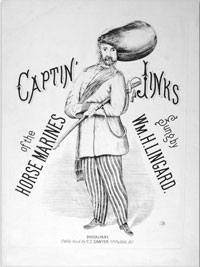
This famous Post-Civil War song was written and sung by William Horace Lingard, an English music hall singer and accomplished female impersonator
who had immigrated to America. Lingard's satirical song, which mocked the fictional soldier's performance in the army, was first published in 1868 by C. C.
Sawyer, Brooklyn, New York. The image on the cover of the song sheet in the CSHS collection seems to illustrate Lingard's comic key verse about the unsuccessful
soldier.
The first day I went out to drill
The bugle sound made me quite ill,
At the Balance step my hat it fell,
And that wouldn't do for the Army
The song won immediate and wide popularity in vaudeville theatre, spawning a number of related artistic works. During the 1870s, Will Hayes wrote a song about
the supposed wife of Jinks, Mistress Jinks of Madison Square, which proved to be all the rage with soldiers of the American Army during that period.
One of three folk art sculptures of the imaginary Captain Jinks by the artist Thomas J. White, dated 1876, once stood outside a tobacco store in Newark,
New Jersey and is now in the Newark Museum. In 1901, the melodrama, Captain Jinks of the Horse Marines, written by Clyde Fitch, starred Ethel Barrymore
at the Garrick theatre in her first Broadway performance. Miss Barrymore was cast, with much trepidation, as the world famous prima donna Mme. Trentoni because
the role was considered too taxing for the young and inexperienced actress. Nevertheless, this role as a Gibson Girl type launched her successful stage career.
1901 was also a banner year for Fitch who managed four consecutive original plays that season, catapulting him to Broadway celebrity.
In 1902, Ernest Crosby, a friend of Mark Twain, wrote a satirical anti-imperialist novel about the Spanish American War entitled Captain Jinks, Hero and
in 1925, Lingard's song morphed again onto the American stage as a musical comedy with lyrics by B. G. DeSylva and music by Lewis E. Gensler and Stephen Jones.
Finally in 1975, Jack Beeson and Sheldon Harnick wrote a modern comic opera based on the turn of the century melodrama by Clyde Fitch. "The work featured more
mature roles with serious emotional depth and range but retained some of Fitch's humorous lines, allowing the original comedy to unfold within relationships among
more fully rounded operatic characters."
Thus, Lingard's serio comic song, Captain Jinks of the Horse Marines, was able to sustain a life span of over a century by its transformation into numerous art
forms in museums, the theatre, in literature, and on the operatic stage.
Bibliography
G. Bordman, The Oxford Companion to American Theatre, New York, 1984; E. Crosby, Captain Jinks, Hero, New Jersey, 1968; W. Demastes,
ed., American Playwrights, 1880-1945, Connecticut, 1995; E. Kirk, American Opera, Chicago, 2001; W. Phelps, Essays on Modern Dramatists,
New York, 1970; W. Umphlett, The Visual Focus of American Media Culture in the Twentieth Century: the modern era, 1893-1945, New Jersey, 2004; American
Memory, Historic American Sheet Music 1850-1920 from Duke University, available at http://lcweb.loc.gov [accessed 24 August 2005]; The Newark Museum: American
Art, Picturing America, available at http://www.newarkmuseum.org/americanart/html/tour/galleries/labels/white.htm [accessed 16 August 2005]; OPERA America's
Encore Magazine, Captain Jinks of the Horse Marines, available at http://www.operaamerica.org/encore/captain.htm [accessed 26 October 2005; Shelburne Museum: A
Bountiful Plenty, Folk Art from the Shelburne Museum, available at http://www.shelburnemuseum.org [accessed 11 May 2005].
|

